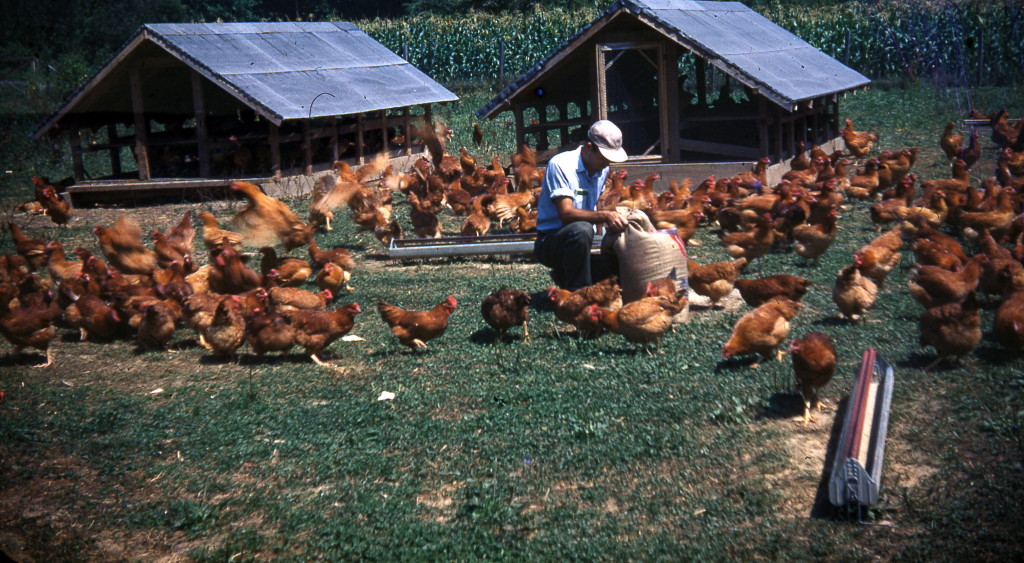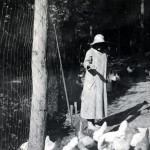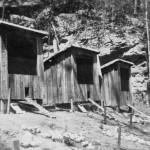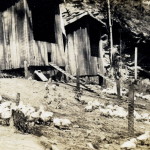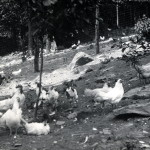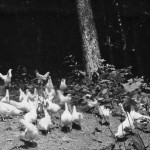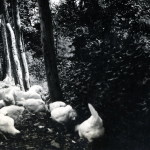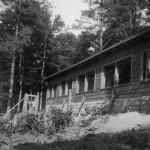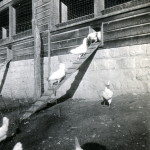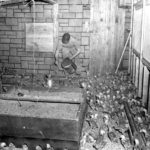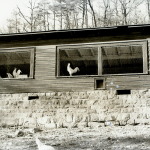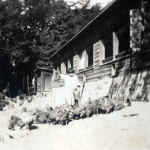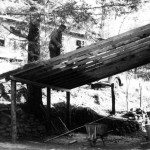Pine Mountain Settlement School
Series 10: BUILT ENVIRONMENT
Poultry Houses
c.1914 – c.1953
TAGS: chickens, chicken houses, poultry farming, chicken coops, animal husbandry, egg baskets, William Hayes, shed-roof poultry houses, commercial poultry farming, chicken ‘n dumplin’s
BUILT ENVIRONMENT Poultry Houses, c. 1914 – c. 1953
The Chicken House actually consisted of multiple chicken houses built to provide shelter for the many chickens that have come and gone to dumplings at Pine Mountain. It was the intent of many of the School’s staff to have a ready supply of eggs and that chicken-and-dumplings be available to entertain when there may be visitors to the campus.
POULTRY HOUSES: Early Days
The first houses were a series of small board and batten structures that were gathered within a fenced off area. Here the chickens could roam in the yard by day but be protected by night and have a place to lay eggs that would stay clean and easy to locate. These small “coops” were very efficient for small-scale chicken farming, but when the flocks became larger, so did the chicken houses. However, as seen above, there was a reversion to the small individual chicken houses in the 1940s and “scratch” corn feed was purchased in sacks rather than grown at the School.
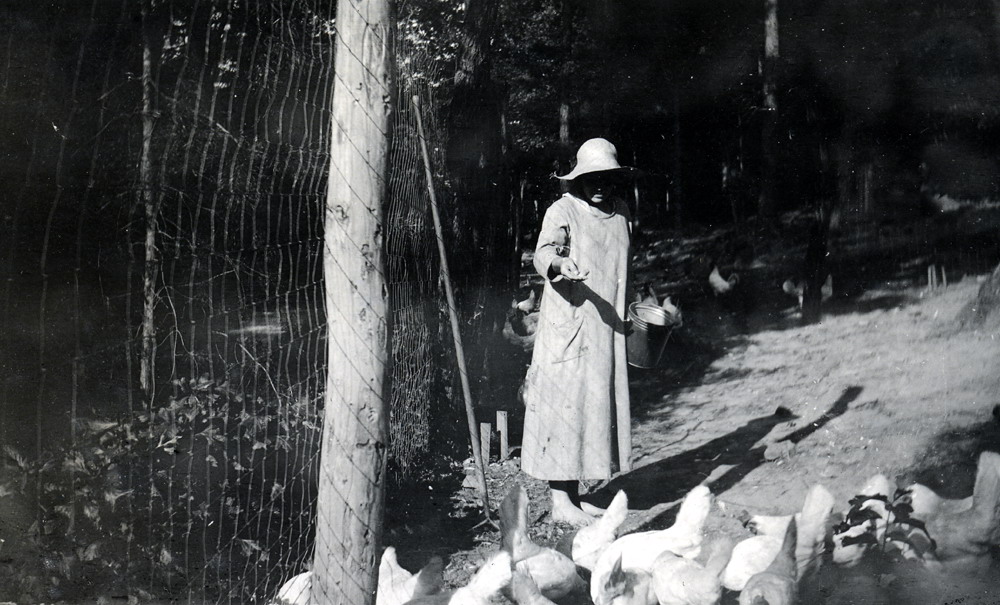
Chickens tended by early staff. [II_7_barn_275a.jpg]
[From an early staff letter, undated, probably c. 1914 or 1916]
This spring we have at last a herd of cows and a dairy. Two weeks ago our six new cows and bull, all Jerseys, were sent up from the Bluegrass, and today we had our first dessert made entirely of milk and eggs. We have a large chicken house and two incubators and have raised fifty-six chickens from the first batch. Two hundred more Leghorns are to come in from the out-side world, and we think that by the end of the summer we will have 400 chickens. One worker devotes all her time to the care of the poultry and she has the most intelligent assistance from one of our older boys, age 15.
And, in the notes of Evelyn Wells‘ History (unpublished), the following paragraph:
In this department too we have had to work through a period of trying out delicate stock, the whole flock being white Leghorns when we first filled our new chicken houses in 1917, from eggs hatched in Miss Fawcett’s incubators. We do know that Rhode Island Reds are far more practical for us, and after years of experimenting have settled down to a very healthy and successful, if somewhat expensive flock of hens.
As poultry farming became more standardized, it also become more expensive. The first poultry flocks and their houses were modest in comparison to later houses, but all poultry house-types serve as visible records of the changes in small rural agricultural practice from the beginning of the twentieth century to its mid-point in the 1950s when industrial production of eggs and poultry became widespread.
POULTRY HOUSES: End of an Era
While poultry farming had always played a role in supplying the School with eggs and poultry meat, the farm later turned to egg production as a commercial endeavor. But, the commercial production of eggs, like other farming practices in the 1950s proved to be too complicated in the tightly controlled markets. By 1953, poultry farming became a poor marketing venture for the School. The open markets could produce eggs more cheaply for the consumer and regulations that limited the sale of poultry meat through the free market system spelled an end to Pine Mountain’s sale of poultry and eggs through that means. By 1953, farming on a large scale at the School came to a close and the end of poultry production marked the end of that era.
Yet, of all the farming initiatives, chickens proved to be the longest lived of the animal husbandry practices. This may have been due to the fact that chickens are relatively easy to manage and the yield in eggs over the life of the hen can be considerable. Even today fresh eggs from chicken flocks are a part of many households in the Pine Mountain community.
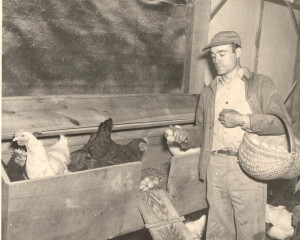
William Hayes, Farm Manager, with the poultry inside the large Chicken House, built in the 1940s. [pmss_hayes_mod.jpg] The basket over his arm is often referred to as an “egg basket” as its shape could hold eggs securely. Constructed of hickory bark, these extremely sturdy egg baskets were part of the local craft. Many photographs in the Pine Mountain Settlement School archives show workers carrying these useful and durable hand-made baskets.
Gallery: POULTRY HOUSES
- Chickens tended by early staff. II_7_barn_275a
- Three chicken houses. II_7_barn_278
- Chicken houses and yard. II_7_barn_278a
- Chickens on slope, c. 1920s.II_7_barn_277
- Chickens at base of tree. II_7_barn_271
- Chickens in the woods. II_7_barn_277a
- Shed-roof poultry house. Chickens, house, and woods. II_7_barn_276
- Shed-roof poultry house. Chicken house, c. early 1940s. II_7_barn_275b
- Shed-roof poultry house. Chickens ascending ramp to house. II_7_barn_272
- Shed-roof poultry house. Chickens leaving chicken house through door with ramp. II_7_barn_271a
- Shed-Roof Poultry House _MSR5790 Cooperative Extension Work in Agriculture and Home Economics Division of Agricultural Engineering College of Agriculture University of Kentucky JB and Wm. Insko 09/18/1942.(sheet 2)
- Shed-Roof Poultry House _MSR5790 Cooperative Extension Work in Agriculture and Home Economics Division of Agricultural Engineering College of Agriculture University of Kentucky JB and Wm. Insko 09/18/1942. (sheet 1)
- Shed-Roof Poultry House _MSR5790 Cooperative Extension Work in Agriculture and Home Economics Division of Agricultural Engineering College of Agriculture University of Kentucky JB and Wm. Insko 09/18/1942.(sheet 2)
- Shed-Roof Poultry House _MSR5790 Cooperative Extension Work in Agriculture and Home Economics Division of Agricultural Engineering College of Agriculture University of Kentucky JB and Wm. Insko 09/18/1942. (sheet 1)
- Poultry house with young chickens. VII 64_life_work_018
- Shed-roof poultry house. Chicken House. [hay_IMAG0147_mod.jpg]
- Shed-roof poultry house. Maya Sudo Album: Chicken House; raking view of front with chickens in yard. 038c
- Farm House. Carport under construction; Shed-roof poultry house, above. c. 1950s. [II_7_farm_house_298c.jpg]
See Also:
BUILT ENVIRONMENT
BUILT ENVIRONMENT Architectural Planning POULTRY HOUSE 1942
DANCING IN THE CABBAGE PATCH VI – Poultry
Return To:
BUILT ENVIRONMENT Guide
|
Title |
Chicken Houses |
|
Alt. Title |
Chicken House ; Poultry House ; |
|
Identifier |
|
|
Creator |
Pine Mountain Settlement School, Pine Mountain, KY |
|
Alt. Creator |
Ann Angel Eberhardt ; Helen Hayes Wykle ; |
|
Subject Keyword |
Chicken House ; chicken houses ; Pine Mountain Settlement School ; Pine Mountain, KY ; Harlan County, KY ; chickens ; dumplings ; eggs ; board and batten ; coops ; poultry farming ; corn feed ; standardization ; industrial production ; commercial ; open markets ; regulations ; animal husbandry ; chicken ‘n dumplin’s ; fencing ; dairy cows ; Jerseys ; incubators ; Leghorns ; Evelyn Wells ; Miss Fawcett ; Rhode Island Reds ; William Hayes ; farm managers ; egg baskets ; hickory bark ; local crafts ; |
|
Subject LCSH |
Chicken House(s) — Pine Mountain Settlement School (Pine Mountain, Ky.) — History. |
|
Date |
2013-09-16 |
|
Publisher |
Pine Mountain Settlement School, Pine Mountain, KY |
|
Contributor |
n/a |
|
Type |
Collections ; text ; image ; |
|
Format |
Original and copies of JPG images, documents, and correspondence in file folders in filing cabinet |
|
Source |
Series 10: Built Environment (Physical Plant) |
|
Language |
English |
|
Relation |
Is related to: Pine Mountain Settlement School Collections, Series 10: Built Environment (Physical Plant) ; Kentucky Virtual Library collections <http://www.kyvl.org/> [searchable] |
|
Coverage Temporal |
c. 1914 – c. 1953 |
|
Coverage Spatial |
Pine Mountain, KY ; Harlan County, KY ; |
|
Rights |
Any display, publication, or public use must credit the Pine Mountain Settlement School. Copyright retained by the creators of certain items in the collection, or their descendants, as stipulated by United States copyright law. |
|
Donor |
n/a |
|
Description |
Core documents, correspondence, writings, and administrative papers about Chicken House(s) ; clippings, photographs, books about Chicken House(s) ; |
|
Acquisition |
Various dates between c. 1914 and c. 1953 |
|
Citation |
Pine Mountain Settlement School Institutional Papers, Pine Mountain Settlement School, Pine Mountain, KY |
|
Processed By |
Helen Hayes Wykle ; Ann Angel Eberhardt ; |
|
Last Updated |
2013-09-16 hhw ; 2014-05-14 aae ; 2016-04-17 hhw ; 2023-03-01 aae ; 2023-05-30 hhw |
|
Bibliography |
Source Pine Mountain Settlement School Institutional Papers. Pine Mountain Settlement School, Pine Mountain, KY. Archival material. |
Back To:
BUILT ENVIRONMENT

